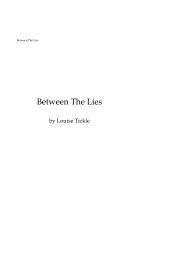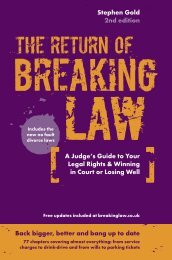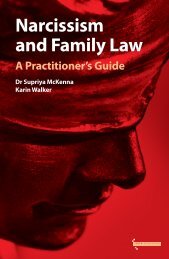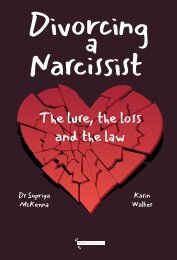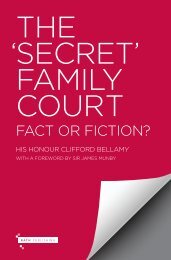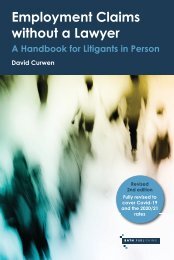Insolvency Made Clear: A Guide for Debtors
Plain English, practical guidance for anyone facing demands over a debt they are struggling to pay.
Plain English, practical guidance for anyone facing demands over a debt they are struggling to pay.
You also want an ePaper? Increase the reach of your titles
YUMPU automatically turns print PDFs into web optimized ePapers that Google loves.
Effect Of Bankruptcy<br />
will only choose to substitute an item if there is a substantial difference between<br />
the sale price of the second-hand item and its replacement price. Otherwise, it<br />
is not worth the Trustee’s time to make the sale.<br />
The second exception means that the bankrupt can keep their bed linen, oven<br />
and basic living equipment. Again the exception would allow a Trustee to substitute<br />
an expensive bed <strong>for</strong> a cheaper one if they deemed it fit. Since second-hand<br />
domestic goods are of little value, it is rare <strong>for</strong> the Trustee to sell them unless<br />
they are almost new.<br />
2.2.2 Legal claims<br />
The bankrupt’s ‘property’ includes any potential legal claims the bankrupt<br />
could make. Only the Trustee in Bankruptcy can sue third parties; the bankrupt<br />
cannot do so themselves. The bankrupt cannot even act as a litigant in person<br />
even if this comes at no direct cost to the bankrupt’s estate. This is because if<br />
the bankrupt brought a claim and lost, the estate would probably be held liable<br />
<strong>for</strong> the costs to the defendant. The Trustee is in charge of making all claims on<br />
behalf of the bankrupt. They can abandon an active case, or settle a claim instead<br />
of taking it to court.<br />
There are two exceptions to this rule. Firstly, a bankrupt can appeal against<br />
their own bankruptcy order. Secondly, the bankrupt can bring a claim where<br />
the claim is personal to the bankrupt – <strong>for</strong> example, a personal injury claim,<br />
a defamation claim or a claim <strong>for</strong> unfair dismissal. Where a claim is a ‘hybrid’<br />
of both types, such as a personal injury claim where the claimant’s car was also<br />
damaged, the claim can only be made by the Trustee. If the Trustee makes a<br />
recovery, they will recover the personal element on behalf of the bankrupt and<br />
will have to give it back to them and not the creditors. The bankrupt should tell<br />
the Trustee about all the possible claims they could make, as part of describing<br />
all of the assets in the estate.<br />
If the Trustee does not want to go ahead with a case, the bankrupt will need to<br />
ask the Trustee to transfer (‘assign’) them the claim if they wish to do so themselves.<br />
A Trustee would be unlikely to allow a bankrupt to commence litigation<br />
while their bankruptcy was undischarged, but they might consider it afterwards.<br />
A solicitor will be cautious about accepting instructions from an undischarged<br />
bankrupt to ensure that the individual has the right to litigate the claim, rather<br />
than their Trustee.<br />
It frequently happens that a bankruptcy order is made on a judgment debt.<br />
Once the bankruptcy order is made, the bankrupt would have no standing to<br />
even challenge this debt, except with the permission of the Trustee or an order<br />
of the court.<br />
15



